Fall 2016 Speakers
German Diplomat to Speak at ASU and Mark Kristallnacht Commemoration
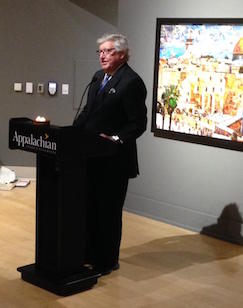 The ASU campus and wider Boone communities are invited to a gathering and commemoration of Kristallnacht, the November 1938 anti-Jewish pogroms in Nazi Germany. The event will feature Klaus Becker, the Federal Republic of Germany's Honorary Consul to North Carolina.
The ASU campus and wider Boone communities are invited to a gathering and commemoration of Kristallnacht, the November 1938 anti-Jewish pogroms in Nazi Germany. The event will feature Klaus Becker, the Federal Republic of Germany's Honorary Consul to North Carolina.
It will take place at the Turchin Center for the Visual Arts on Thursday, November 10, from 4:00 until 5:00 pm.
Kristallnacht (or the "Night of Broken Glass") refers to the nation-wide pogroms instigated by Nazi Propaganda Minister Joseph Goebbels in coordination with Adolf Hitler that began during the night of November 9, 1938. Mainly carried out by SA and SS units, the pogroms lasted throughout November 10and, at many places, even until November 12 and longer. In the process, the Nazis and other Germans and Austrians broke much more than the glass of synagogues and stores. They killed close to a hundred German and Austrian Jews. Many more were driven to commit suicide. Some 26,000 Jewish men were deported to concentration camps in the Reich. The SA, SS and their helpers, plundered and destroyed thousands of Jewish stores and homes as well as hundreds of synagogues. Unlike Imperial Russia, modern Germany had not been the site of a pogrom in modern times and this mass crime marked a key shift in the Nazi regime's anti-Jewish policies that culminated in a systematic genocide during the subsequent war.
The main speaker at the commemoration, representing the Federal Republic of Germany, will be Klaus Becker. A native of the university town of Marburg in Hesse, Klaus Becker grew up in the Ruhr Valley, site of Germany's main steel producing companies, where his father worked as a technician. He has lived in Germany, Italy, Brazil and the U.S. His international steel trading company, Nirosteel, is based in Charlotte. He has served as President of the N.C. Chapter of the German-American Chamber of Commerce for years. In 2013, he accepted the appointment as the Federal Republic of Germany's Honorary Consul to North Carolina. His remarks will shed light on the Federal Republic's coming to terms with the Nazi past, Jewish life in Germany today, and the present state of German-American relations. He will be joined by ASU Provost Dr. Darrell Krueger, the director of the Center for Judaic Holocaust and Peace Studies Dr. Thomas Pegelow Kaplan and the Co-President of the Temple of the High Country Ira Abrams.
UNC-Chapel Hill's Jewish Studies Center Director to Speak at ASU
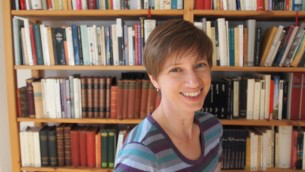 On November 15, Professor Ruth von Bernuth will give an evening talk entitled "How the Wise Men Got to Chelm: The Life and Times of a Yiddish Folk Tradition."
On November 15, Professor Ruth von Bernuth will give an evening talk entitled "How the Wise Men Got to Chelm: The Life and Times of a Yiddish Folk Tradition."
The talk will start at 7:00 pm at the Reich College of Education, Room 124.
Von Bernuth examines the collected tales of the "wise men," or "fools," of Chelm, which constitute one of the best-known folktale traditions of Eastern-European Jewry. Since the late nineteenth century, Chelm has figured prominently not only as a real Eastern-Polish city, but also as an imaginary place onto which questions of Jewish identity, history and community have been projected. Her examination demonstrates how literary Chelm has function as a model of society, situated between utopia and dystopia. The imagined foolish town, von Bernuth argues, has allowed writers to entertain as well as to stress a variety of societal problems. Literary Chelm fulfills this function in Jewish literature to the present day. Professor von Bernuth's talk is based on her recently-published New York University Press book, which will be available for purchase after the lecture.
Professor von Bernuth serves as the director of the Carolina Center for Jewish Studies at UNC-Chapel Hill, the most successful Jewish Studies Center in the UNC system. She is also an Associate Professor at UNC's Department of Germanic and Slavic Languages and Literatures, which she joined in 2008. Professor von Bernuth holds a Ph.D. in medieval and early modern German literature from Humboldt University in Berlin, Germany (2005). She is also the author of Wunder, Spott und Prophetie: Natürliche Narrheit in den Historien von Claus Narren, a study of ideas of natural folly in early modern German literature.
On Wednesday, November 16, Professor von Bernuth and her work will also be at the center of the next Lunch Research Colloquium of ASU's Center for Judaic, Holocaust and Peace Studies. This colloquium is based on two recent contributions by the speaker on Jewish conversion and identity and the carnivalesque in early modern Ashkenaz that are available from the Center upon request. The 2-hour colloquium will begin at 11:00 am.
Professor von Bernuth's visit is organized by the Center for Judaic, Holocaust and Peace Studies and co-sponsored by ASU's Department of Languages, Literatures, and Cultures, the Department of Anthropology, the Department of Philosophy and Religion and the university's Hillel chapter.
Attendance is free to ASU faculty, students, and staff, but an RSVP is required. A lunch (free of charge for participants) will be served. To RSVP and for more information, please contact holocaust@appstate.edu or call 828.262.2311.
Prominent Holocaust Historian from Yad Vashem to Visit ASU
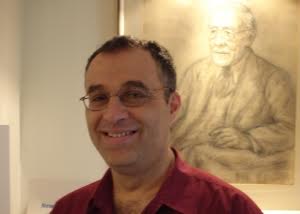 In early November, the Center for Judaic, Holocaust and Peace Studies and ASU will be host to Professor Guy Miron, one of Israel's most prominent Holocaust scholars of the generation that followed the field's founding cohort of Dan Michman, Yehuda Bauer and the late Israel Gutman. Guy Miron is Professor of Jewish History and Chair of the Department of History, Philosophy and Jewish Studies at the Open University of Israel. He is also the director of the Research Center for the Study of the Holocaust in Germany at the International Institute for Holocaust Research at Yad Vashem, the World Center for Holocaust Research, Documentation, Education and Commemoration in Jerusalem. Furthermore, Professor Miron is the head of the Research and Publications Committee of the Leo Baeck Institute for the Study of German and Central European Jewry. His important publications include German Jews in Israel: Memories and Past Images (in Hebrew, 2004); and The Waning of the Emancipation, Jewish History, Memory, and the Rise of Fascism in Germany, France, and Hungary (2011). His visit is part of the Center for Judaic, Holocaust and Peace Studies' ongoing international outreach and research collaborations.
In early November, the Center for Judaic, Holocaust and Peace Studies and ASU will be host to Professor Guy Miron, one of Israel's most prominent Holocaust scholars of the generation that followed the field's founding cohort of Dan Michman, Yehuda Bauer and the late Israel Gutman. Guy Miron is Professor of Jewish History and Chair of the Department of History, Philosophy and Jewish Studies at the Open University of Israel. He is also the director of the Research Center for the Study of the Holocaust in Germany at the International Institute for Holocaust Research at Yad Vashem, the World Center for Holocaust Research, Documentation, Education and Commemoration in Jerusalem. Furthermore, Professor Miron is the head of the Research and Publications Committee of the Leo Baeck Institute for the Study of German and Central European Jewry. His important publications include German Jews in Israel: Memories and Past Images (in Hebrew, 2004); and The Waning of the Emancipation, Jewish History, Memory, and the Rise of Fascism in Germany, France, and Hungary (2011). His visit is part of the Center for Judaic, Holocaust and Peace Studies' ongoing international outreach and research collaborations.
At ASU, Professor Miron will give an evening lecture entitled "Modern Jewish historiography – Between 'Usable Past,' National Narrative and the Trans-National Challenge." It will take place at ASU's Belk Library, Room 114, on Tuesday, November 1, from 7:30 pm to 9:30 pm. Until the Holocaust, German-Jewish history was, his lecture will demonstrate, associated with Jewish enlightenment, emancipation and assimilation, new religious movements, modern Jewish politics, as well as the escalating threat of anti-Semitism. Jewish historians and intellectuals of this pre-Holocaust period, predominantly from Germany and Eastern Europe, have dealt extensively with German-Jewish history as a "Usable Past," which was a major part of their coming to terms with fundamental questions of modern Jewish identity. After 1945 German-Jewish history became a topic for a trans-national Jewish debate and was reinterpreted predominantly by scholars from Britain, Israel and the US. In addition, non-Jewish historians, mainly from Germany, started to deal with this complex history whose interpretation has also major implications for German history. Professor Miron's lecture will analyze this development and its meanings. The lecture is free and open to the public. No tickets are required.
On Wednesday, November 2, Professor Miron and his work will also be at the center of the fall term's first JHP Lunch Research Colloquium. This colloquium evolves around reconsiderations of the significance of space and time in German-Jewish and Holocaust history. It is based on two recent contributions by the speaker that are available from the Center upon request. The 2-hour colloquium will begin at 11:00 am. Attendance is free to ASU faculty, students, and staff, but an RSVP is required. A lunch (free of charge for participants) will be served. To RSVP and for more information, please contact holocaust@appstate.edu or call 828.262.2311.
Professor Miron's visit is organized by ASU's Center for Judaic, Holocaust, and Peace Studies and co-sponsored by UNC's Carolina Center for Jewish Studies, Duke University's Center for Jewish Studies, Duke University's Center for European Studies and the North Carolina German Studies Seminar & Workshop Series.
The CAB and the Temple of the High Country Present:
"Talks from the Temple" by Dr. Simon Sibelman, former Director of the Center for JHP Studies
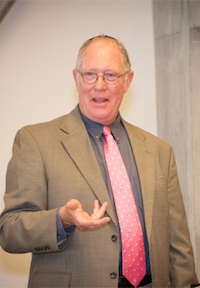 To be held at the Temple of the High Country
To be held at the Temple of the High Country
1043 West King Street, Boone
Wednesday, October 19
5:30pm - "Who Are Jews?: What is Judaism?"
Thursday, October 20
10:00am - "Anti-Semitism: The Longest Hatred"
1:00pm - "The Righteous Gentiles of the Shoah"
Co-sponsored by the Center for Judaic, Holocaust and Peace Studies.
For more information and to RSVP, email Suzanne Lasky Gerard at videomydog@aol.com or Floris Leipzig at floris15@aol.com.
World-Renowned Holocaust Scholar C. R. Browning to Give a Talk at ASU
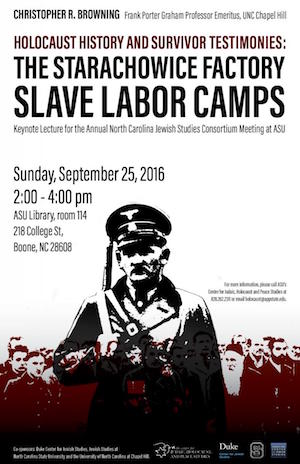 The keynote lecture of the 2016 annual meeting of the North Carolina Jewish Studies Consortium at ASU will be given by Frank Porter Graham Professor Emeritus Christopher R. Browning of Tacoma, Washington State. Browning is one of the foremost experts and key pioneers in the field of Holocaust Studies. His impressive publications include influential works such as Ordinary Men: Reserve Police Battalion 101 and the Final Solution in Poland, which has redefined the subfield of perpetrator studies, and Origins of the Final Solution. He has given expert witness testimony for Canadian, Australian, and British prosecutors in trials against alleged Nazi perpetrators and Holocaust deniers. Browning is the Frank Porter Graham Professor Emeritus at the History Department of the University of North Carolina at Chapel Hill. A gifted lecturer, he speaks on his research around the globe.
The keynote lecture of the 2016 annual meeting of the North Carolina Jewish Studies Consortium at ASU will be given by Frank Porter Graham Professor Emeritus Christopher R. Browning of Tacoma, Washington State. Browning is one of the foremost experts and key pioneers in the field of Holocaust Studies. His impressive publications include influential works such as Ordinary Men: Reserve Police Battalion 101 and the Final Solution in Poland, which has redefined the subfield of perpetrator studies, and Origins of the Final Solution. He has given expert witness testimony for Canadian, Australian, and British prosecutors in trials against alleged Nazi perpetrators and Holocaust deniers. Browning is the Frank Porter Graham Professor Emeritus at the History Department of the University of North Carolina at Chapel Hill. A gifted lecturer, he speaks on his research around the globe.
Professor Browning's talk will take place from 2:00 until 4:00 pm on Sunday, September 25, at Belk Library, Room 114, on the ASU campus. It examines the suffering and memories of the Jewish inmates of a factory slave labor camp in German-occupied Poland during the Second World War. Entitled "Holocaust History and Survivor Testimony: The Starachowice Factory Slave Labor Camps," Browning investigates a crucial part of the Nazi genocide that had not received sufficient attention. His work largely draws on accounts from survivors of the Starachowice camp many of which originated in oral history interviews he conducted with former camp inmates. Browning's talk is based on his recent book Remembering Survival.
Professor Browning's visit is organized by ASU's Center for Judaic, Holocaust, and Peace Studies and co-sponsored by the University of North Carolina at Chapel Hill, North Carolina State University, and the Duke Center for Jewish Studies.
The event is free and open to the public. For more information, please email holocaust@appstate.edu or call 828.262.2311.